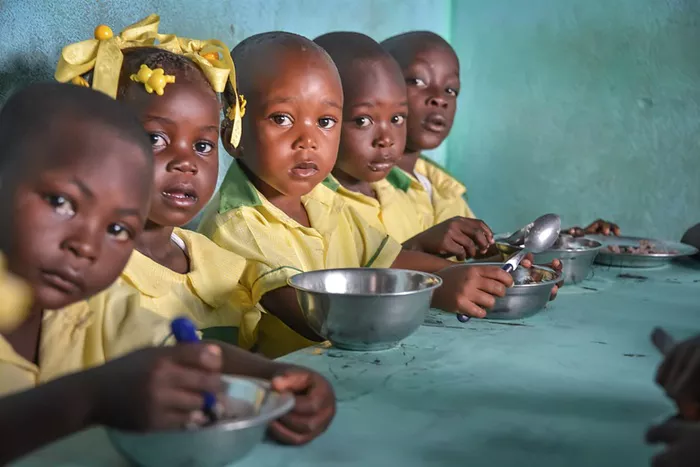In Gaza, Ikhlas, heavily pregnant with her fourth child, recounts the harrowing experience of pulling her daughter from the rubble after yet another bombardment. “We escaped death,” she says, from her refuge in the southern city of Rafah. “We survive on whatever aid we receive.”
In Port-au-Prince, Haiti, Paulema Rodeline holds her seven-month-old daughter, Kermissa, close as she describes how gang violence has disrupted her life and that of her pregnant elder daughter. “When the shooting started, we hid under the bed,” recalls the 36-year-old mother of four. “We later ran to a church, but the violence only intensified.”
Across the globe, conflicts and crises are creating severe hunger emergencies that endanger pregnant and breastfeeding women and their young children—groups particularly vulnerable to malnutrition. During these emergencies, many women and children are displaced or living in unsanitary conditions with limited access to clean water. This dire situation has catastrophic implications for children, whose survival, physical and cognitive development, and future well-being depend on adequate nutrition during their first 1,000 days of life. Mothers also require a nutritious diet to support pregnancy and breastfeeding.
The World Food Programme (WFP) is dedicated to preventing malnutrition through its nutrition programs. Last year, WFP provided specialized food and nutrition counseling to over 28 million pregnant and breastfeeding women and young children, with more than 23 million receiving aid during emergencies.
However, challenges such as insufficient funding and limited access to affected populations often prevent WFP and other humanitarian organizations from reaching those in need.
In Gaza, where nearly the entire population faces severe food insecurity, WFP aims to assist nearly half a million pregnant and breastfeeding women and young children this year with calorie- and nutrition-rich paste. The program also strengthens local capacities for malnutrition screening and provides counseling on the importance of healthy diets.
“My daughter used to cry all night,” says Muna, another mother in Gaza, about her infant daughter. Since receiving WFP’s specialized paste, “She sleeps better and stays full,” Muna adds. Despite these efforts, the distribution of aid in Gaza remains challenging due to ongoing conflict and damaged infrastructure.
“There is no breakfast, lunch, or dinner,” Ikhlas laments about her children’s constant hunger. “I give them whatever I can to keep them quiet.”
Ikhlas, who spoke to WFP while nine months pregnant, is focused on providing for her three existing children. “I don’t think about myself or my unborn baby,” she says. “I need to sustain my three kids.”
“Breastfeeding is not just a nourishing choice; it is a fundamental right and a vital lifeline for mothers and infants,” says Nihal Nassereddin, a nutrition officer with WFP’s Palestine Country Office. “But we need funds and access to succeed in supporting all women in Gaza.”
In Haiti, gang violence has displaced nearly 600,000 people in the capital, Port-au-Prince, with over half of them forced out since early last year. This crisis has led to severe food shortages, affecting about five million Haitians—nearly half of the population. Over 250,000 children under five are expected to suffer from acute malnutrition this year, and a significant number are already experiencing stunted growth due to inadequate diets.
WFP plans to assist 2.4 million people across Haiti in 2024, including pregnant and breastfeeding women and their children. In Port-au-Prince, Rodeline receives monthly cash payments from WFP, including funds specifically for soon-to-be and nursing mothers. These funds come with nutrition counseling and advice on breastfeeding.
At Lycée Jean-Marie Vincent, where Rodeline’s family found shelter, WFP partners with Doctors of the World to provide mobile clinics for children. These clinics offer special food supplements and refer cases needing further treatment to UNICEF. Additionally, hot meals are delivered to recently displaced individuals across the city.
The school, now a shelter for over 2,000 displaced people, is overcrowded. Families live in cramped conditions with limited resources. Finding work is difficult, and food is scarce. WFP and other aid are crucial for survival.
“We eat one meal a day,” Rodeline says, describing their diet of maize, spaghetti, or whatever food is available. She breastfeeds both Kermissa and her daughter’s eight-month-old baby, supplementing with fruit or millet porridge when possible. Despite her efforts, the burden of caring for four older children and two babies is overwhelming. “I have trouble sleeping at night,” Rodeline admits.
The struggles faced by Ikhlas and Rodeline highlight the critical need for continued support and access to resources for the most vulnerable populations in times of crisis.


